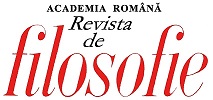Senzație, reprezentare și idei în filosofia cunoașterii lui John Locke
Sensation, Representation, and Ideas in John Locke’s Philosophy of Knowledge
Author(s): Noni-Emil IordacheSubject(s): Early Modern Philosophy
Published by: Editura Academiei Române
Keywords: knowledge; sensation; reflection; idea;
Summary/Abstract: This essay aims to present the role of ideas in human knowledge in John Locke’s conception. For this, we will use Locke’s major work, An Essay Concerning Human Understanding. “Ideas” are the cornerstone of Locke’s theory of human knowledge. According to him, singular or general knowledge is the perception of a concordance or discordance between ideas. For him, the material of our knowledge is the idea. The role of ideas in knowledge is to represent existing ones. Ideas are received and perceived by the mind to form singular sentences. Therefore, the role of ideas is to make known the existing beings, in establishing a correspondence between the known subject and the external reality. As an epistemological foundation, the idea is the principle of all knowledge and, precisely, of singular knowledge. In order to determine the extent and limits of our knowledge, we must examine the elements of knowledge, that is, how simple ideas arise through sensation and reflection.
Journal: Revista de filosofie
- Issue Year: LXIX/2022
- Issue No: 3
- Page Range: 395-402
- Page Count: 8
- Language: Romanian

